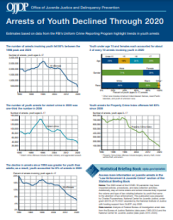Index Crimes
Group Offending and Criminal Careers: Violence Among Juvenile Delinquents and Adult Offenders, Final Report
New Orleans Inmate Survey: A Test of Greenwood's Predictive Scale
Importance of culture in measuring tribal crime seriousness: scoping review of crime seriousness indices
Effects of building demolitions on firearm violence in Detroit, Michigan
A Discussion of Current Crime Forecasting Indices and An Improvement to the Prediction Efficiency Index for Applications
Arrests of Youth Declined Through 2020
Multilevel Evaluation of Project Safe Neighborhoods
Project Safe Neighborhoods (PSN) is a DOJ-sponsored initiative to reduce violent crime, particularly gun crime, by fostering cooperation by criminal justice agencies and local partners to develop and implement strategic approaches.
See the YouTube Terms of Service and Google Privacy Policy
Priority Prosecution of the Serious Habitual Juvenile Offender: Roadblocks to Early Warning, Early Intervention, and Maximum Effectiveness -- The Philadelphia Study, Executive Summary of Findings, Final Report
Effect of Arrests on Crime - A Multivariate Panel Analysis
Ultimate Impacts of Sentencing Reforms and Speedy Trial Laws: A User's Guide to the Machine-Readable Files and Documentation and Codebook
Effect of Police Employment on Crime
Crime Severity and Criminal Career Progression
Crime and Justice Atlas 2000
Probation and Parole: Public Risk and the Future of Incarceration Alternatives
Pilot Study for Collecting Data from Arrestees and an Analysis of the Quality of Self-Disclosure: Final Report
Including Tourists in Crime Rate Calculations for New Casino Jurisdictions: What Difference Does It Make?
Aggregation Bias in Deterrence Research - An Empirical Analysis
Less Prison, More Police, Less Crime: How Criminology Can Save the States from Bankruptcy
Professor Lawrence Sherman explains how policing can prevent far more crimes than prison per dollar spent. His analysis of the cost-effectiveness of prison compared to policing suggests that states can cut their total budgets for justice and reduce crime by reallocating their spending on crime: less prison, more police.
See the YouTube Terms of Service and Google Privacy Policy
An Examination of Justice Reinvestment and Its Impact on Two States
Funded in part by the Bureau of Justice Assistance and the Pew Center on the States, the justice reinvestment project is a data-driven strategy aimed at policymakers to "reduce spending on corrections, increase public safety and improve conditions in the neighborhoods to which most people released from prison return." Representatives from two states where the justice reinvestment strategy is currently being implemented will discuss how it is being used to reduce the rate of incarceration and how states can reinvest in local communities.



